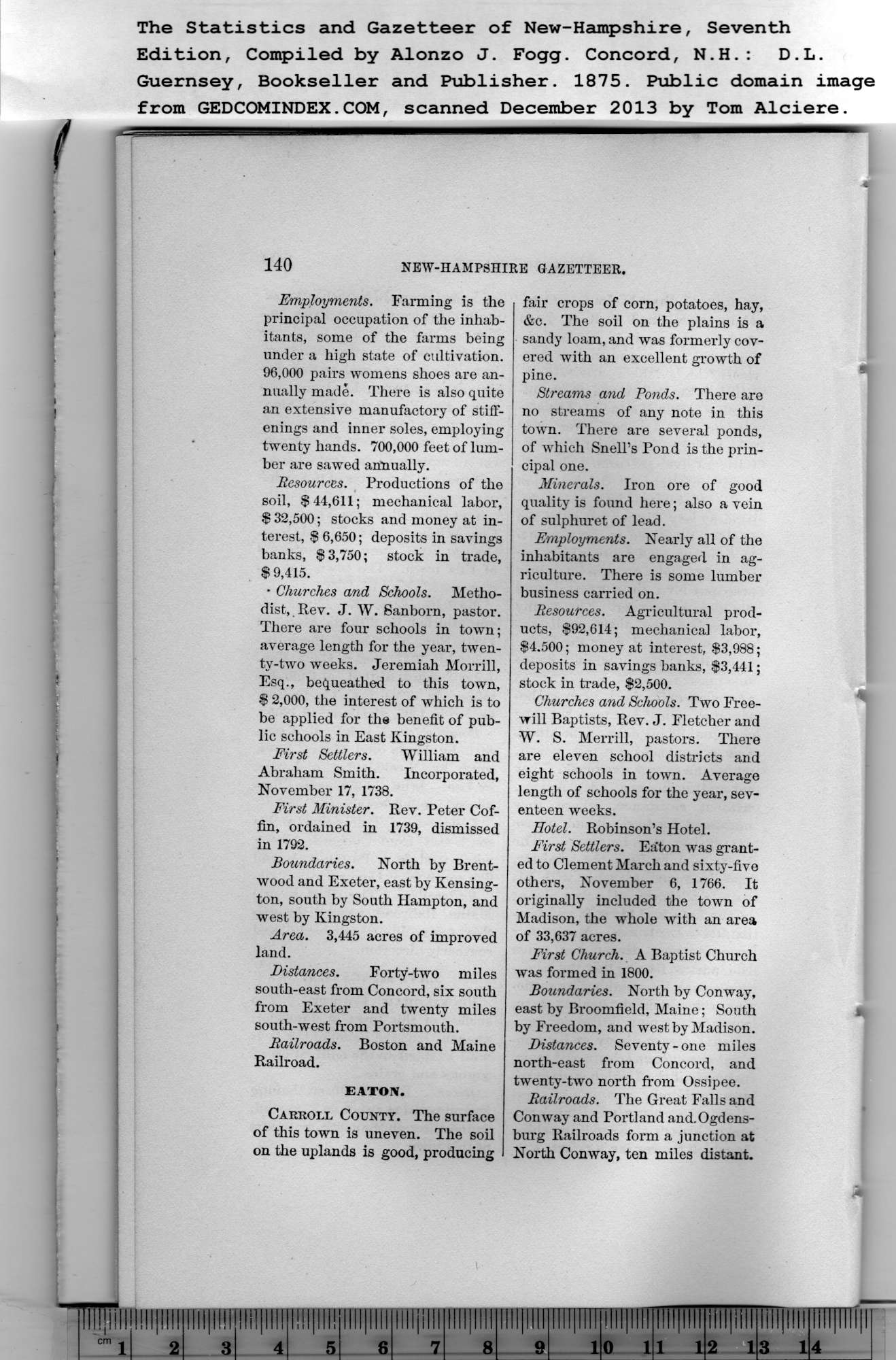|
Employments. Farming is the
principal occupation of the inhab-
itants, some of the farms being
under a high state of cultivation.
96,000 pairs womens shoes are an-
nually made. There is also quite
an extensive manufactory of stiff-
enings and inner soles, employing
twenty hands. 700,000 feet of lum-
ber are sawed annually.
Resources. Productions of the
soil, $44,611; mechanical labor,
$ 32,500; stocks and money at in-
terest, $ 6,650; deposits in savings
banks, $3,750; stock in trade,
$9,415.
• Churches and Schools. Metho-
dist, Rev. J. W. Sanborn, pastor.
There are four schools in town;
average length for the year, twen-
ty-two weeks. Jeremiah Morrill,
Esq., bequeathed to this town,
$ 2,000, the interest of which is to
be applied for the benefit of pub-
lic schools in East Kingston.
First Settlers. William and
Abraham Smith. Incorporated,
November 17, 1738.
First Minister. Rev. Peter Cof-
fin, ordained in 1739, dismissed
in 1792.
Boundaries. North by Brent-
wood and Exeter, east by Kensing-
ton, south by South Hampton, and
west by Kingston.
Area. 3,445 acres of improved
land.
Distances. Forty-two miles
south-east from Concord, six south
from Exeter and twenty miles
south-west from Portsmouth.
Railroads. Boston and Maine
Railroad.
EATON. |
Carrotx County. The surface
of this town is uneven. The soil
on the uplands is good, producing
fair crops of corn, potatoes, hay,
&c. The soil on the plains is a
sandy loam, and was formerly cov-
ered with an excellent growth of
pine.
Streams and Ponds. There are
no streams of any note in this
town. There are several ponds,
of which Snell’s Pond is the prin-
cipal one.
Minerals. Iron ore of good
quality is found here; also a vein
of sulpliuret of lead.
Employments. Nearly all of the
inhabitants are engaged in ag-
riculture. There is some lumber
business carried on.
Resources. Agricultural prod-
ucts, $92,614; mechanical labor,
$4.500; money at interest, $3,988;
deposits in savings banks, $3,441;
stock in trade, $2,500.
Churches and Schools. Two Free-
will Baptists, Rev. J. Fletcher and
W. S. Merrill, pastors. There
are eleven school districts and
eight schools in town. Average
length of schools for the year, sev-
enteen weeks.
Hotel. Robinson’s Hotel.
First Settlers. Ea'ton was grant-
ed to Clement March and sixty-five
others, November 6, 1766. It
originally included the town of
Madison, the whole with an area
of 33,637 acres.
First Church. A Baptist Church
was formed in 1800.
Boundaries. North by Conway,
east by Broomfield, Maine; South
by Freedom, and west by Madison.
Distances. Seventy - one miles
north-east from Concord, and
twenty-two north from Ossipee.
Railroads. The Great Falls and
Conway and Portland and.Ogdens-
burg Railroads form a junction at
North Conway, ten miles distant. |
